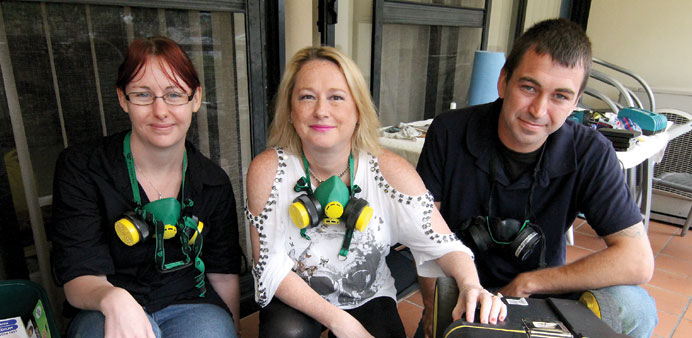Leah McGlashan (left), Lee Iordanidis (centre) and Daniel Roberts at Sylvania Waters, Sydney.
By Sid Astbury
The antidote to a day-job dealing with death can sometimes be giving life a helping hand. It was that way for Lee Iordanidis, owner of a Sydney crime-scene cleaning company. She was called in after a woman gave birth in a car while on the way to hospital.
“The baby was popping out so there was blood everywhere,” she said. “I enjoyed it. I couldn’t charge them for it. I got to do something coming into the world that was alive.”
It was a change from clearing away the detritus from often violent deaths that is the stock-in-trade of her company, All Gone Extreme Clean. Forensic cleaners go in after the police have finished their work, sometimes contracted by property owners or public authorities and sometimes by the families of victims or perpetrators.
Gabrielle Simpson, whose Clean Queens company has been in the business since 2001, said a lot of the work came from what police call unattended death. “Sometimes when there are incidents in public places — accidents or suicides or when people jump — we get there so quick that we’re getting ready when they’re moving the body out,” she said. “You do what’s necessary. You don’t have an emotional attachment. These aren’t people that you know.”
On some jobs it is hard to be detached. Simpson cleared out a luxury harbourside flat after an elderly woman died alone and felt she came as close to her as any member of her family.
“She played golf. She’d go on cruises. She wrote endless letters of complaint,” Simpson said. “She had her 21st birthday presents in a suitcase on the bed never opened. We found a stack of unopened Christmas cards. It’s very invasive, what we do and what we see.”
Before the commercial operators were in business, families had to clean up themselves. Noel McNamara, who with wife Bev runs the Crime Victims Support Association, welcomes the advent of professionals. “People who lose a loved one are in shock,” he said. “You’re there but you’re not really there. So it’s good that someone comes around. Theres’s always tell-tale signs on walls and things of what’s gone on.”
Leah McGlashan, who works for All Gone, said that saving families from doing the job themselves was what helped carry her through. “Yes, it’s gross. Yes, it’s gruesome. Yes, it smells. But someone has to do it. You tell yourself: that’s why I’m here.”
Daniel Roberts, a fellow employee, said being compassionate was as important as not being squeamish. “You ask yourself what you would want as a family,” he said. “Bits and pieces that have sentimental value. If it’s a photograph you put it on one side and decontaminate it afterwards so it can go back to the family. You don’t want to miss anything for them.”
Roberts echoed Simpson’s words about learning so much about a life in its often gory aftermath. “By the end of the day you know a lot about them. They become a real person,” he said.
It is that part of the job that makes up for the fastidious, perhaps even compulsive, personal hygiene at the end of a day’s work. Roberts can recall having five consecutive showers.
Iordanidis insisted that she was in a people business rather than a cleaning business. “We have to be emotionally attached to these people. You can’t be cold-blooded,” she said.
“I always walk them back through the house when we’ve finished. You have someone crying and if you’re not emotionally involved with that person you can’t hug them and let them know it’s fine.”
Simpson, who said there was a fine balance between compassion and detachment, recounted cleaning up a crime scene where a successful young woman and her new and drug-addled partner had died of an overdose.
The flat was neat and tidy. The shoes in the cupboards were lined up. Everything was as it should be — except for where a young couple had been found dead on the bed. “It was horrible. It was really horrible,” Simpson said. “There were four of us doing it and we were just gob-smacked.”
What repels some, keeps others engaged in the business. As well as the uplift of helping others in the worst of circumstances, there is the privileged glimpse into a stranger’s life.
“We’re touching everything that dead person has owned,” Iordanidis said. “We’re seeing the last minutes of their life. It’s sometimes a bit hard. When the skip goes away with the couch in it, you think ‘I’ve just thrown this person’s life into the rubbish. It’s like they don’t exist now.’” — DPA

